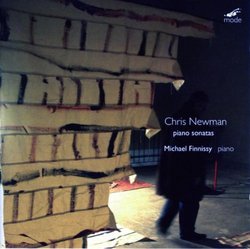| All Artists: Chris Newman, Michael Finnissy Title: Chris Newman: Piano Sonatas Members Wishing: 1 Total Copies: 0 Label: Mode Original Release Date: 1/1/2008 Re-Release Date: 7/22/2008 Genre: Classical Styles: Chamber Music, Historical Periods, Classical (c.1770-1830) Number of Discs: 1 SwapaCD Credits: 1 UPC: 764593020127 |
Search - Chris Newman, Michael Finnissy :: Chris Newman: Piano Sonatas
 | Chris Newman, Michael Finnissy Chris Newman: Piano Sonatas Genre: Classical
|
Larger Image |
CD Details |
CD ReviewsMarvelous creativity scarecrow | Chicago, Illinois United States | 06/18/2009 (5 out of 5 stars) "you find a modern soul, a composer with a proclivity to spread his subjectivity all over the lifeworlds of cognition and you say where's the center? is this simply another manefestation of what Deleuze touted during his life, the creative "rhizomatic" threads, as Leibniz finding the center from a vast repertoire of fragmented objects,incessant folds of the mind; we utilize that excites us in the Arts.
Chris Newman is a poet, a performer himself,and much more from the synergy that occurs in between all the Arts he pursues; but his rhizomatic center seems to be music,in particular the timbre of the piano, with "piano concerti" two under the desk; and these marvelous pieces, sonatas, that do have some center for their subjectivity, the beauty is the simplicity; those who work in England found question, took issue with continental serial modernity and how it manifested itslef in obsessions, perhaps too much science and not enough soul or lifeworld familiarity,if you cannot see it and touch it it doesn't exist, Well David Hume did tell us, only experience teaches, all else is interpretive speculation; We can situate Newman as Cardew, and Skempton, John White,Hobbs and Finnissy all have this affinity for the fragments of the lifeworld,what the commons, the evertday teaches, how it produces knowledge; real worldly experience, as Heideggar might say, that temporality resides in what you do everyday, what you see, and touch and feel, this determines how one might then create music. Newman's musical language has a form of developmental realm to it,more Scarlatti than Beethoven for sure;However he's really not interested in the "miniature" statement, the "miniature" object as say the extremes of Skempton or Huber reveal,scoffing at the romantic developmental mindset does produce beautiful music;;instead we find a kind of portrayment of simple dramas,single scenes rather than entire Acts; that come again from a lived experience. He likes chordal displays,convoluted situations within a lyrical melodic melos always at work; those shocking chords that bend the inherent diatonic canvas, as Skempton in some respects, but as you listen you find Newman's language quite easy,quite agreable and his music is suggestive of place,home, the heath, the warmth of fire, the smell of the earth through a window never direct;;a natural place where music is created; I'd say more rural than urban, he writes pastoral music, perhaps as a means of escape the dangers of the city,the obsessions of the city that Mahler had warned us of in the "Ninth Symphony" "Burlesque"; Newman's music is itself a "comfort zone" to reside in, where you do find subjectivity whole;" |

 Track Listings (9) - Disc #1
Track Listings (9) - Disc #1